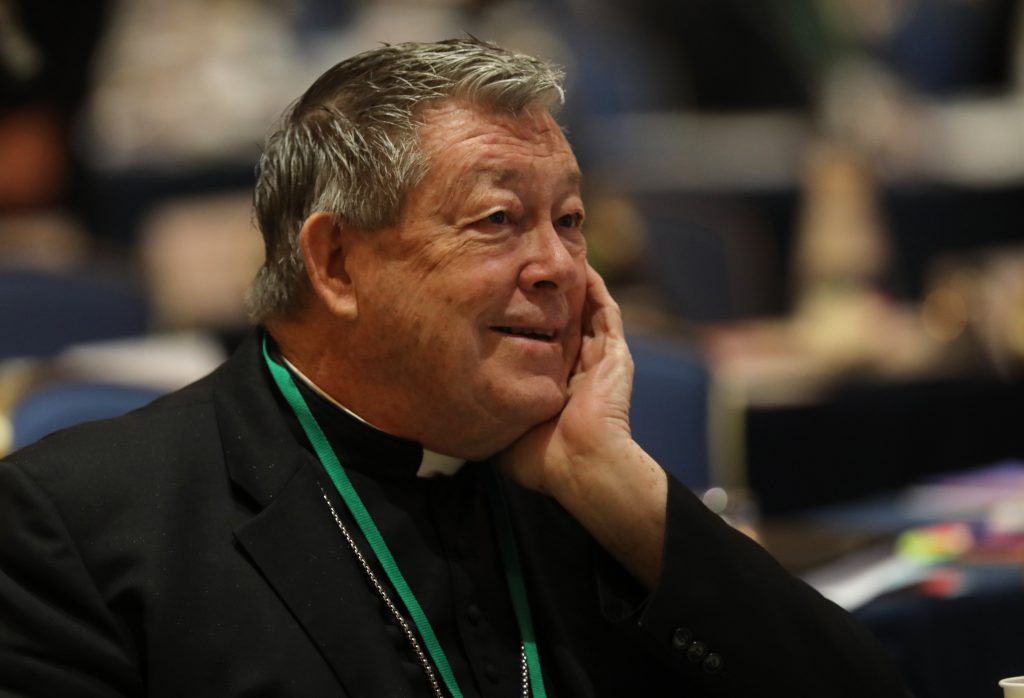The Vatican announced Tuesday morning that Pope Francis has accepted the resignation of Auxiliary Bishop Edward W. Clark of Los Angeles, who oversaw the Archdiocese of Los Angeles’ most populous and diverse pastoral region for over two decades.
Bishop Clark became episcopal vicar of the central Our Lady of the Angels Pastoral Region in 2001 after his appointment by Saint Pope John Paul II as an auxiliary bishop. He turned 75 on Nov. 30, 2021, and as required by canon law, turned in his resignation to the pope when he reached 75.
“I congratulate Bishop Clark on his retirement,” said Los Angeles Archbishop José H. Gomez in a statement Tuesday morning. “For more than 20 years now, he has served Jesus Christ and the faithful of Los Angeles with zeal, dedication, and love.
“As the auxiliary bishop entrusted to the archdiocese’s largest and most diverse pastoral region, he will be remembered as a shepherd who was always close to the people he served, especially those who were poor and living on the margins.”
Archbishop Gomez noted that Bishop Clark’s tenure was marked by his tireless efforts to bridge old divisions during his two decades as a bishop.
“His lasting legacy includes his strong work against the scourge of racism and discrimination against African Americans and his commitment to building up the bonds of mutual trust and respect with our Native American brothers and sisters,” said the archbishop.
Those who have known and worked with Bishop Clark over the years described him as an open-minded, compassionate leader able to understand and serve the needs of Catholics in the region.
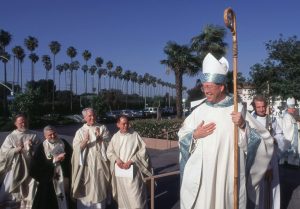
‘A friend and mentor’
Edward William Clark was born Nov. 30, 1946 in Minneapolis but moved to California with his family and attended local schools before enrolling in the archdiocesan high school seminary and eventually, St. John’s Seminary in Camarillo. He was ordained to the priesthood by the then-Archbishop of Los Angeles and future cardinal Timothy Manning in 1972.
Dave Estrada remembers becoming friends with Clark on their first day of class in September 1960 at Our Lady Queen of Angels Seminary High School in Mission Hills. The pair graduated from the high school in 1964 and from St. John’s four years later in 1968. Estrada eventually discerned out of the seminary and went on to serve in the U.S. Air Force and as an L.A. County probation officer. Six decades since they first met, the two have remained close friends.
“As a minor seminarian, who would think that any of us would someday be a bishop, right?” said Estrada, who today serves as a permanent deacon at St. Benedict Church in Montebello. “But God works in ways we don’t always understand.”
Estrada credits Clark for not only being a friend, but also a mentor who “enabled me to grow as a deacon.”
For those who have known him as a student or later, a teacher and bishop, a couple of Clark’s attributes are hard to forget. One of them is his remarkable intellect.
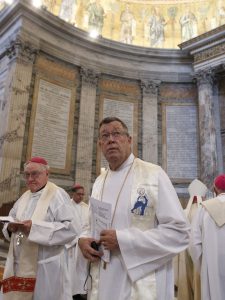
“He is an avid reader, from U.S. and world history to ecclesiology to novels,” Father Truc Nguyen told Angelus. “He has a photographic memory and is able to recall so many stories and backgrounds of the people he meets.”
As a student at St. John’s in the mid-1990s, Fr. Nguyen was impressed by how his Christology professor, Father Ed Clark, explained incarnational spirituality in a way “that made it easy to understand.”
“He introduced a side of Christ’s humanity and divinity that I could connect to, and it made a difference in understanding who is Jesus for me,” said Fr. Nguyen, who since 2006 has served as pastor at Cathedral Chapel in the Mid-City area of Los Angeles, where Bishop Clark has been in residence since 2001.
Not only does he have a “remarkable memory,” said Deacon Estrada, but his old classmate “has a good sense of humor, which is very important in dealing with any sort of challenges.”
Upon taking up his new assignment as a bishop, Bishop Clark’s years of experience as an educator also proved valuable beyond the boundaries of the archdiocese.
In his statement Tuesday morning, Archbishop Gomez recalled Bishop Clark’s work as chair of the California Catholic Bishops’ education committee and his “instrumental” leadership in yearslong process that led to a 2016 action plan “for the growth and sustainability of Catholic schools in the state’s twelve dioceses.”
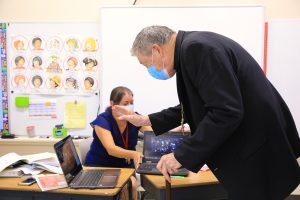
‘A godsend’
Long before he became an auxiliary bishop, Father Clark was in residence at Transfiguration Church in South L.A., one of a handful of historically Black parishes in the archdiocese. Not because he had to, but because he wanted to.
“He has a godsend for us,” said Anderson Shaw, director of the African American Catholic Center for Evangelization (AACCE). “As African American Catholics, we are such a small number that we can easily be overlooked. But Bishop Clark never let that happen. He’s always there at our activities, like the Martin Luther King Jr. Prayer Breakfast, showing his support.”
When Shaw first came to the AACCE, he served on Bishop Clark’s regional advisory committee. Later, the AACCE established a parish representative council, where parishioners from two dozen parishes meet monthly. At first, Bishop Clark said he would try to come to at least two or three meetings a year, “because he wanted to get a feel for the needs of the African-American community,” Shaw recalls. “Well, he’s ended up attending almost every single meeting, every month, and that has really been an asset.”
“He’s totally committed to serving the community,” added Shaw. “When we’ve needed to have someone to support us, he’s been there for us,” even despite health challenges in recent years.
That kind of openness to dialogue and other cultures, local Catholics say, has made a big difference during Bishop Clark’s tenure.
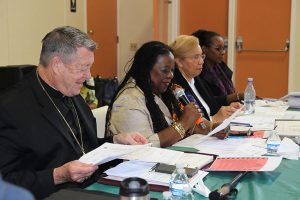
“He’s taught me and brought me with him to experience cultures I maybe haven’t known as well,” said Fr. Nguyen. “He’s involved with the Black community, he’s traveled to Asia to gain new perspectives on serving those communities, he participates in rituals with the Native American community. He just doesn’t discriminate.”
Sister Kathleen Bryant, a Religious Sister of Charity from Los Angeles, remembers knowing then-Father Clark when he was rector-president of St. John’s Seminary, and being impressed by his efforts to make the increasingly ethnically diverse student population feel welcome.
“At one point he had beautiful statues made of saints and historical figures of each culture that was represented at St. John’s, so that students from every culture could recognize that they had a place in the seminary and in the church,” recalls Sister Bryant. “And that comes from his being so open to every culture and expression of faith within our church.”
Sylvia Mendivil Salazar, coordinator of the archdiocesan Office of Native American Concerns Ministry, likes to recall the time Bishop Clark was bestowed with the name “Talking Fire Hawk” in a special ceremony led by the Gabrieleño San Gabriel Band of Mission Indians.
In the Native American culture, Salazar explains, “fire” symbolizes strength while “Hawk” symbolizes messenger. The moment was a recognition of his advocacy and support for local the Native American community.
“Los Angeles County alone has the largest population of Native Americans in the country – over 150,000,” Salazar says. “And Bishop Ed has always been ready and able to be with us, to participate in our ceremonies, to learn about our ways and our forms of prayer, to attend our annual Tekakwitha Conference."
Salazar praised Bishop Clark’s efforts in rallying California bishops’ support for state legislation that offers better protection for sacred Native American burial grounds. In 2018, he was instrumental in establishing a series of protocols recognizing the Native Americans of California as the “First People of the Land” and offering guidelines for pastoral service toward their communities.
“We regard Bishop Ed as a messenger for us,” said Salazar. “There were so many years where we were neglected by the church, but he has opened a lot of doors that had been closed to us.”
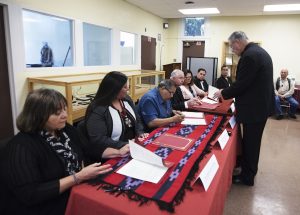
‘A gift for the Region’
Cardinal Roger Mahony, who ordained Bishop Clark to the episcopacy in 2001, said Bishop Clark’s 21 years of “superb episcopal service” were “marked by fresh and creative pastoral outreach efforts” for parishes in his region.
“His past experience in Catholic education and the seminary, together with his doctoral studies, gave him a unique background to lead a complex and varied region,” the cardinal said.
The cardinal credits Bishop Clark with creating “a unique survey process” during his tenure involving parish listening sessions about the future of their parish when fewer priests were available, challenging them to decide how best their own parish would be served with varying scenarios of priest availability.
“That exercise at the parish level was sobering for the parishioners, since they presumed they would always have the same number of priests available to serve their parish,” the cardinal noted. “The reality of fewer priests began to sink in.”
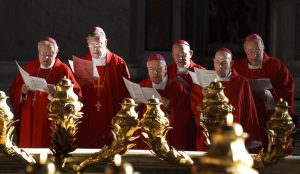
But during the process, “creative solutions emerged,” such as changing Mass and ministry schedules, twinning with another parish, and creating more collaborative programs with neighboring parishes.
“Bishop Clark’s vision in looking forward to parish life and ministry with fewer priests was groundbreaking,” said Cardinal Mahony. “His constant presence to the priests, parishes and the many other institutions and apostolates, was a gift for the Region.”
Outside of the parish, Sister Bryant said Bishop Clark was a trusted ally and advocate for the communities of women religious serving the archdiocese.
“During the year of consecrated life (2015), we’d celebrate that in our houses,” Sister Bryant. “Bishop Clark came to our celebrations, with a relaxed and informal manner that put everyone at ease. And one year he asked me to deliver an academic address at the college seminary.
“And as women religious, we appreciate that. He has always been very respectful to us. He listens to, empowers and celebrates women. He has deep respect for all cultures and all people.”
Editor-in-chief Pablo Kay also contributed to this report.
